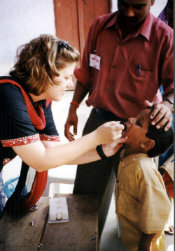Summary | Excerpt | Reviews | Beyond the Book | Read-Alikes | Genres & Themes | Author Bio

Science, Politics, and the Human Costs of Defeating Disease
by Meredith WadmanThis article relates to The Vaccine Race
 Vaccines are responsible for the global eradication of smallpox, rinderpest, and soon, it is hoped, polio and measles. Despite the backlash against vaccines, which has caused the occasional reemergence of German measles and chickenpox, new scientific advances promise to tackle scourges like malaria, HIV and cancers.
Vaccines are responsible for the global eradication of smallpox, rinderpest, and soon, it is hoped, polio and measles. Despite the backlash against vaccines, which has caused the occasional reemergence of German measles and chickenpox, new scientific advances promise to tackle scourges like malaria, HIV and cancers.
The World Health Organization highlights other notable effects:
Protection against related diseases: The measles vaccination, for example, can protect against dysentery, bacterial pneumonia, keratomalacia and malnutrition.
Cancer prevention: The Human Papilloma Virus vaccination is expected to substantially reduce the incidence of cervical cancer. (See 'Beyond the Book' for The Immortal Life of Henrietta Lacks for more about the HPV vaccine).
Reduced health care costs: Globally, the savings from vaccines have been estimated in the tens of billions of U.S. dollars. Malaria (for which several vaccines are in development) costs sub-Saharan Africa $100B in lost gross annual domestic product, which explains why a malaria vaccine is so sought after.
Preventing antibiotic resistance: A vaccine introduced in 2000 has resulted in a 57% decline in infections caused by penicillin resistant Streptococcus pneumoniae; and vaccines being developed for Staphylococcus aureus are expected to address the increasing resistance of this potentially flesh-eating bacteria (staph is a common and usually mild bacteria unless it gets in under the skin).
Extending life expectancy: Vaccines can be especially beneficial for the elderly. In the U.S., for example, older people vaccinated against the influenza vaccine had a 50% lower risk of mortality from all causes, compared to unvaccinated counterparts.
Safer travel: The ease of global air travel has increased the risk of exposure to infectious diseases transmitted by travelers, evidenced by the recent Ebola epidemic in West Africa. Vaccinations have already greatly decreased the risks of global epidemics such as influenza and hepatitis.
Female empowerment: As vaccines contribute to the reduction in child mortality rates, women have fewer children and can allocate more resources to them, leading to significant educational, social and economic benefits. In addition, the ability to vaccinate can empower women to protect their own health and that of their children through their own actions, giving an added psychological feeling of control in their lives.
Protection against bioterrorism: The potential for vaccines to protect against bioterrorism threats such as smallpox has led governments to stock necessary vaccines, and to develop response systems for biological weapons.
Economic growth: Health is fundamental to economic growth. In addition to vaccinations leading to a healthier population in themselves, the infrastructure and personnel required for an effective and sustainable immunization program give opportunities for better primary health care services, particularly in the critical perinatal and early infancy period.
Picture of boy receiving polio vaccine from Centers for Disease Control and Prevention
Filed under Medicine, Science and Tech
![]() This "beyond the book article" relates to The Vaccine Race. It originally ran in April 2017 and has been updated for the
September 2018 paperback edition.
Go to magazine.
This "beyond the book article" relates to The Vaccine Race. It originally ran in April 2017 and has been updated for the
September 2018 paperback edition.
Go to magazine.
Your guide toexceptional books
BookBrowse seeks out and recommends the best in contemporary fiction and nonfiction—books that not only engage and entertain but also deepen our understanding of ourselves and the world around us.